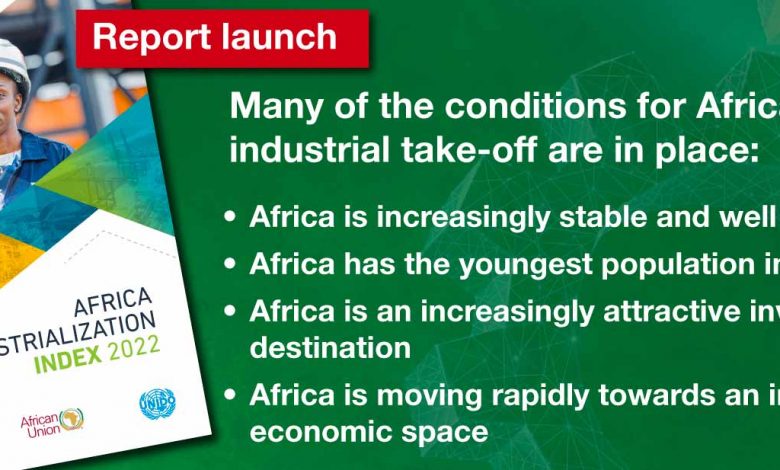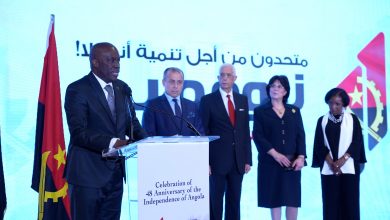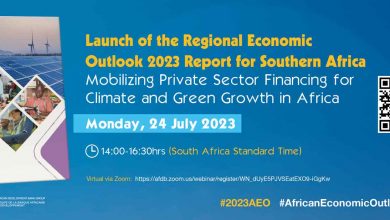New report from the African Development Bank, partners finds 37 African countries have industrialized in the last decade | African Development Bank

Diplomat.Today
The African Development Bank
2022-11-24 00:00:00
——————————————-
According to a new report from the African Development Bank, the African Union and the United Nations Industrial Development Organization (UNIDO), 37 of Africa’s 52 countries have industrialized in the past 11 years.
The Africa Industrialization Index (AII) report provides a country-level assessment of the progress of 52 African countries across 19 key indicators. The report will enable African governments to identify peer countries to benchmark their own industrial performance and identify best practices more effectively.
The African Development Bank, the African Union and UNIDO jointly launched the inaugural edition of the AII on the sidelines of the African Union Summit on Industrialization and Economic Diversification in Niamey, Niger.
Scoring industrialization across a range of metrics
The Index’s 19 indicators cover manufacturing performance, capital, labor, business environment, infrastructure and macroeconomic stability. The index also ranks the industrialization of African countries on three dimensions: performance, direct determinants and indirect determinants. Direct determinants include endowments such as capital and labor and how they are used to drive industrial development. Indirect determinants include favorable environmental conditions such as macroeconomic stability, healthy institutions and infrastructure.
South Africa maintained a very high ranking throughout the 2010-2021 period, closely followed by Morocco, which held second place from 2022. Egypt, Tunisia, Mauritius and Eswatini round out the top six over the period.
Abdu Mukhtar, Director of the African Development Bank for Industrial and Trade Development, represented the institution at the launch event. He said that while Africa had shown encouraging progress in industrialization over the period 2010-2022, the Covid-19 pandemic and the Russian invasion of Ukraine had slowed its efforts and exposed gaps in production systems. “The continent has a unique opportunity to solve this dependency by further integrating and conquering its own emerging markets.”
He added: “The African Continental Free Trade Zone creates a once-in-a-lifetime single market opportunity for 1.3 billion people and total aggregate consumer and business spending of up to $4 trillion creates an opportunity to strengthen their trade and manufacturing ties and finally achieve industrial competitiveness from regional integration, as other regions have done.”
The African Development Bank has invested up to $8 billion over the past 5 years under its Industrialize Africa High-5 priority. “In the pharmaceutical sector alone, we plan to spend at least $3 billion by 2030,” Mukhtar said.
Building a productive industry will be integral to Africa’s development and provide a pathway to accelerated structural transformation, formal job creation at scale and inclusive growth. However, Africa’s share of global production has fallen to its current level of less than 2%. A more proactive industrial policy is seen as crucial to reversing the trend, but this is knowledge-intensive and requires a detailed understanding of the constraints and opportunities each country faces.
Production added value more important than size of the economy
Among the report’s other key findings:
- During the coverage period, Djibouti, Benin, Mozambique, Senegal, Ethiopia, Guinea, Rwanda, Tanzania, Ghana and Uganda all improved by five or more places in the ranking.
- The best performing countries are not necessarily those with the largest economies, but those that generate high per capita production value, with a significant share of manufactured goods destined for export;
- North Africa remains the most advanced African region in terms of industrial development, followed by Southern Africa, Central Africa, West Africa and East Africa.
Synergies with the African Industry Observatory
The Africa Industrialization Index was one of two new tools presented at the event. The second – and complementary – African Industry Observatory, unveiled by UNIDO and the African Union, will serve as a central online knowledge platform to collect, analyze and consolidate the quantitative data needed for qualitative analysis of national, regional and pancontinental industry trends. forecasts and comparisons.
Chiza Charles Chiumya, Acting Director for Industry, Minerals, Entrepreneurship and Tourism of the African Union Commission, said: “These tools will greatly enhance our industrial policy-making and help bring the requisite focus that industrialization needs from both policymakers and as well as the private sector, which will now see clearly where the continent has opportunities.” Chiumya represented AU Trade and Industry Commissioner Albert Muchanga.
“The African Industry Observatory and the Africa Industrialization Index will help consolidate inter-institutional cooperation, strengthen each institution’s influence on policy dialogue for accelerating industrial development, and enhance understanding of industrial development dynamics,” said Victor Djemba, head of UNIDO’s Africa division.
The Extraordinary African Union Summit on Industrialization and Economic Diversification and the Extraordinary African Union Session on the African Continental Free Trade Area are currently taking place in Niamey, Niger, through November 25, 2022. The theme of the summit is: Industrializing Africa: Renewed commitment to inclusive and sustainable industrialization and economic diversification.
Download the report in English or French
——————————————-



